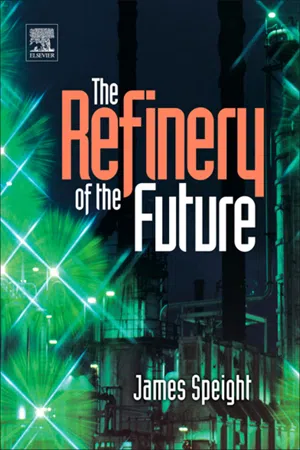
- 416 pages
- English
- ePUB (mobile friendly)
- Available on iOS & Android
The Refinery of the Future
About this book
As feedstocks to refineries change, there must be an accompanying change in refinery technology. This means a movement from conventional means of refining heavy feedstocks using (typically) coking technologies to more innovative processes that will coax the last drips of liquid fuels from the feedstock.This book presents the evolution of refinery processes during the last century and as well as the means by which refinery processes will evolve during the next three-to-five decades. Chapters contain material relevant to (1) comparisons of current feedstocks with heavy oil and bio-feedstocks; (2) evolution of refineries since the 1950s, (3) properties and refinability of heavy oil and bio-feedstocks, (4) thermal processes vs. hydroprocesses, and (5) evolution of products to match the environmental market.Process innovations that have influenced refinery processing over the past three decades are presented, as well as the relevant patents that have the potential for incorporation into future refineries.• Comparison of current feedstocks with heavy oil and bio-feedstocks. • Evolution of refineries over the past three decades. • Properties and refinability of heavy oil and bio-feedstocks. • Thermal processes vs. Hydroprocesses. • Evolution of products to match the environmental market.- Investigates the engineering and plant design challenges presented by heavy oil and bio-feedstocks- Explores the legislatory and regulatory climate, including increasingly stringent environmental requirements- Examines the trade-offs of thermal processes vs. hydroprocesses
Frequently asked questions
- Essential is ideal for learners and professionals who enjoy exploring a wide range of subjects. Access the Essential Library with 800,000+ trusted titles and best-sellers across business, personal growth, and the humanities. Includes unlimited reading time and Standard Read Aloud voice.
- Complete: Perfect for advanced learners and researchers needing full, unrestricted access. Unlock 1.4M+ books across hundreds of subjects, including academic and specialized titles. The Complete Plan also includes advanced features like Premium Read Aloud and Research Assistant.
Please note we cannot support devices running on iOS 13 and Android 7 or earlier. Learn more about using the app.
Information
Table of contents
- Cover Image
- Table of Contents
- Front Matter
- Copyright
- Preface
- Chapter 1. Feedstocks
- Chapter 2. Refining Processes
- Chapter 3. Refining Chemistry
- Chapter 4. Distillation
- Chapter 5. Thermal Cracking
- Chapter 6. Catalytic Cracking
- Chapter 7. Deasphalting and Dewaxing Processes
- Chapter 8. Hydrotreating and Desulfurization
- Chapter 9. Hydrocracking
- Chapter 10. Refinery of the Future
- Glossary
- Index